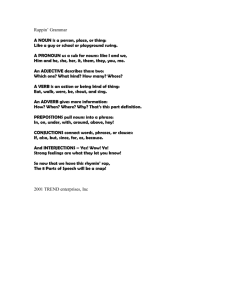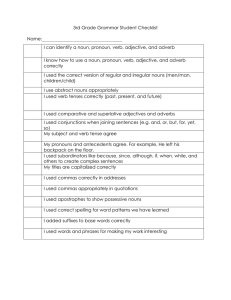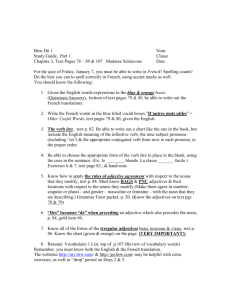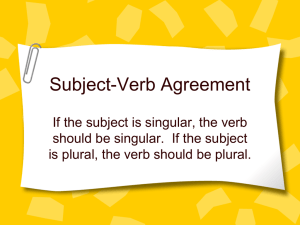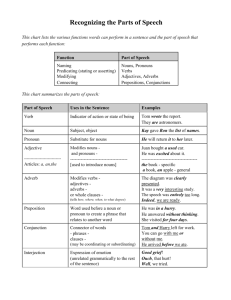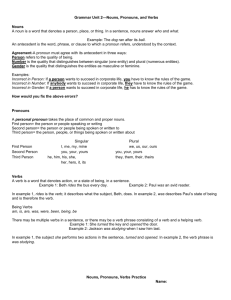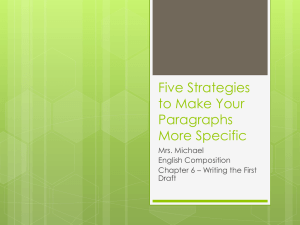Parts of Speech
advertisement
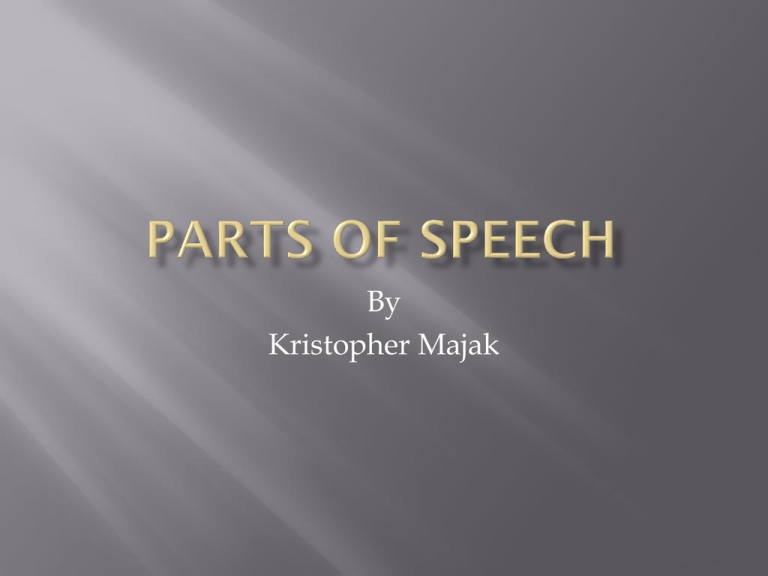
By Kristopher Majak A noun is a person, place, thing or idea Proper nouns are specific. We capitalize proper nouns. Carlos kicked the ball to Miguel. Common nouns are not specific. We leave common nouns lower case unless they begin a sentence. Carlos kicked the ball to Miguel. A pronoun is a word that is used in place of one or more nouns or pronouns. I, me, my, mine, we , us, our, ours, you, your, yours, he, him, his, she, her, hers, its, it, they, them, their, theirs, myself, ourselves, yourself, yourselves, himself, herself, itself, themselves, this, that, these, those, who, whom, which, what, whose, all, another, any, anybody, anyone, anything, both, each, either, everyone, everything, few, many, more, most, much, neither, nobody, no one, nothing, one, other, several, some, somebody, something, such Gabe turned in his homework today. The word that a pronoun replaces is called an antecedent. Gabe turned in his homework today. An adjective is a word that is used to describe a noun or a pronoun. The warm, gooey, delicious pizza. An article lets you know whether you are talking about something in particular or something in general. A, an, the *use an before a word starting with a vowel. I bought an orange at the store. We returned the movie to the store. An adverb describes a verb, adjective, and adverb. Adverbs normally end in “ly” He sang beautifully. The rain fell softly. A verb is a word used to express action or a state of being. A verb phrase consists of at least one main verb and one or more helping verbs. Helping verbs: can, could, do, did, does, had, has, have, may, shall, should, will, would. The boy is leaving for Texas tomorrow. She should not have borrowed that necklace. A preposition shows time and place. Without prepositions, you wouldn’t be able to show relationships between words. Aboard, about, above, across, after, against, along, amid, among, around, as, at, before, behind, below, beneath, beside, besides, between, beyond, by, concerning, down, during, except, for, from, in, inside, into, like, near, of, off, on, onto, out, outside, over, past, since, through, throughout, till, to, toward, under, underneath, until, up, upon, with, within, without A conjunction is a word that joins words or groups of words. For, and, nor, but, or, yet, so Jim wrote down the number, but he lost it. I do work at home and at school. An interjection is a word that expresses emotion. It has no relation to the rest of the sentence. Ah, aha, oh boy, hey, hurrah, oh, whoops, ouch, whew, yikes, yippee Read each of the sentences below. Then identify the part of speech of each word. 1.We rode on the subway. 2.The sun was up when we left the house. 3. Ernesto lives a few miles up the coast.
